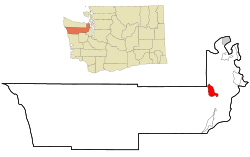Quilcene, Washington
| Quilcene, Washington | |
|---|---|
| CDP | |
| Nickname(s): Pearl of the Peninsula | |
 Location of Quilcene, Washington |
|
| Coordinates: 47°49′55″N 122°53′7″W / 47.83194°N 122.88528°WCoordinates: 47°49′55″N 122°53′7″W / 47.83194°N 122.88528°W | |
| Country | United States |
| State | Washington |
| County | Jefferson |
| Area | |
| • Total | 10.1 sq mi (26.2 km2) |
| • Land | 9.8 sq mi (25.3 km2) |
| • Water | 0.4 sq mi (1.0 km2) |
| Elevation | 43 ft (13 m) |
| Population (2000) | |
| • Total | 591 |
| • Density | 60.6/sq mi (23.4/km2) |
| Time zone | Pacific (PST) (UTC-8) |
| • Summer (DST) | PDT (UTC-7) |
| ZIP code | 98376 |
| Area code(s) | 360 |
| FIPS code | 53-56975 |
| GNIS feature ID | 1524768 |
Quilcene is a census-designated place (CDP) in Jefferson County, Washington, United States. The population was 591 at the 2000 census.
The community is located on the scenic Olympic Peninsula along the seawater-filled glacial valley of the Hood Canal. Each year many visitors enjoy the panoramic views of Mount Rainier, Puget Sound and Seattle from the summit of nearby Mount Walker, the only peak facing the Puget Sound that has a road to its summit. The Olympic National Forest lands in Quilcene hold a wealth of Douglas fir, spring-blooming Pacific rhododendrons, Oregon grape, and salal.Leland Lake is located near Quilcene.
Quilcene oysters, named after the community, have an international reputation among restaurateurs. Quilcene has one of the largest oyster hatcheries in the world. The canal's mild currents make it an ideal habitat for the oysters.
Early inhabitants of the area were the Twana, inhabiting the length of the Hood Canal, and rarely invading other tribes. The Quilcene ("salt-water people") were a distinct band of these people.
The Wilkes Expedition charted the place as Kwil-sid in 1841. Hampden Cottle, a logger from Maine, and several other families settled there in 1860 and eventually established a town. The town was originally situated on the banks of the Quilcene river, before being moved to higher ground. The economy in Quilcene was based primarily on farming and logging and by 1880, the town had a population of 53.
...
Wikipedia
